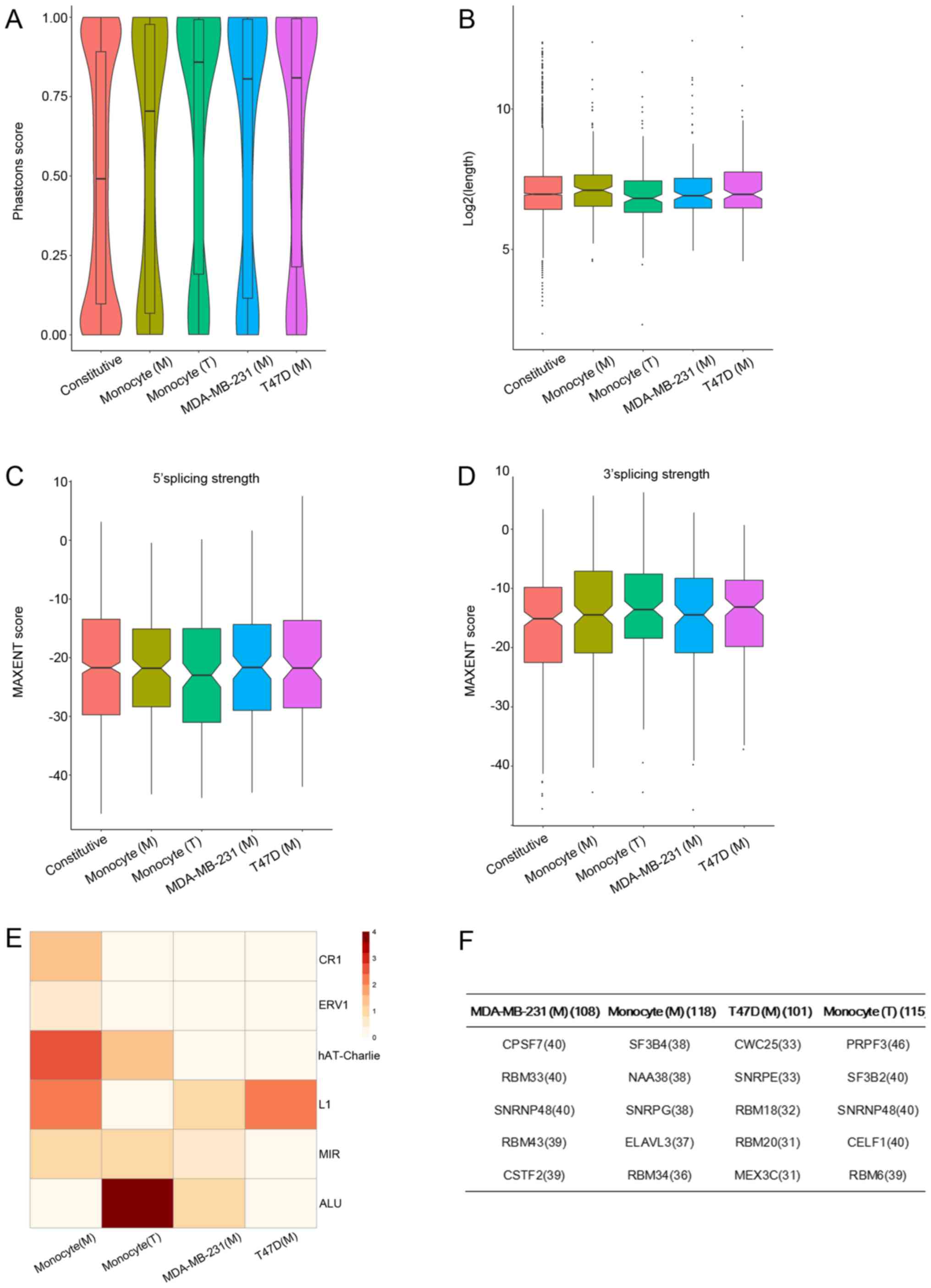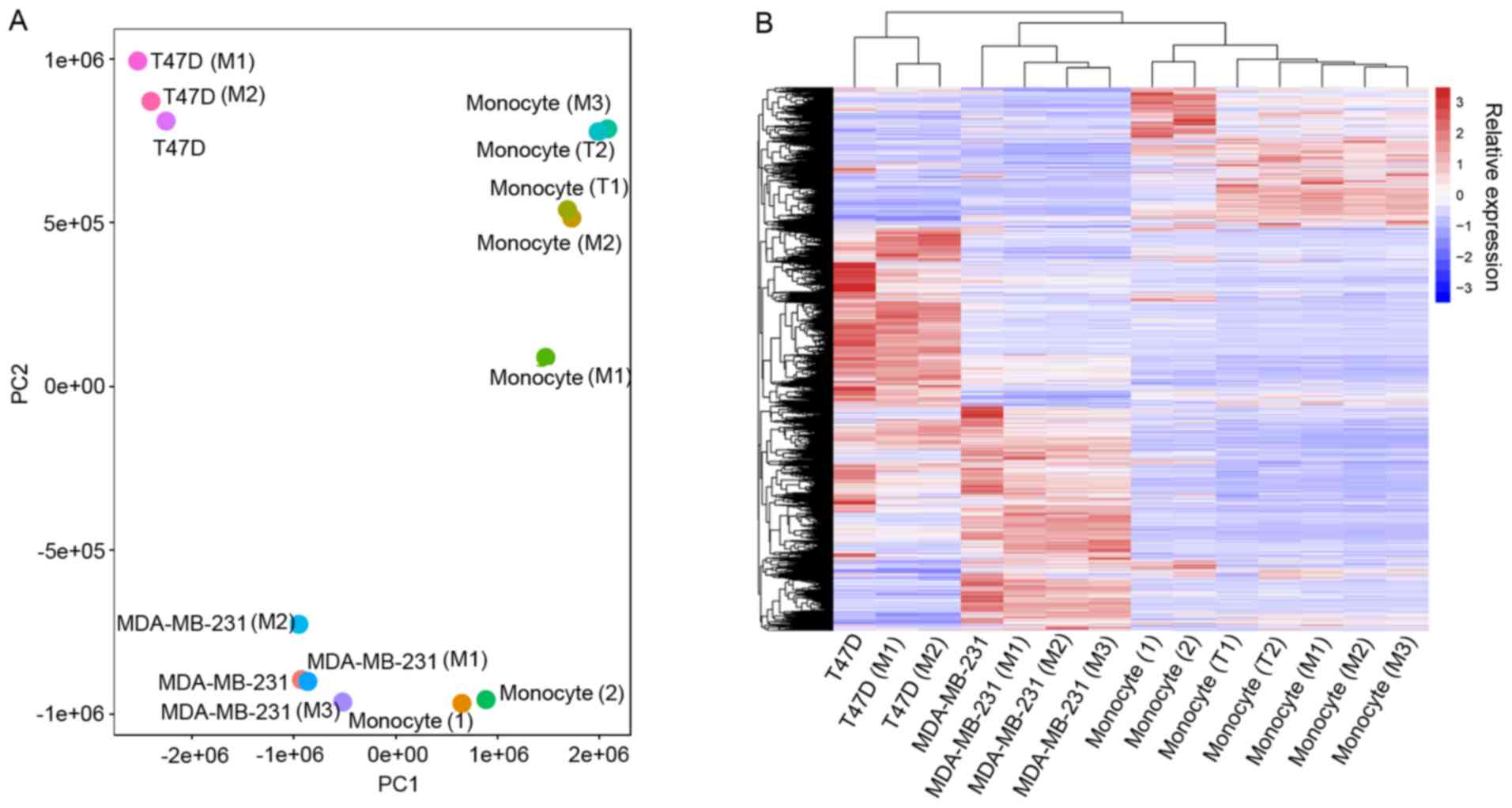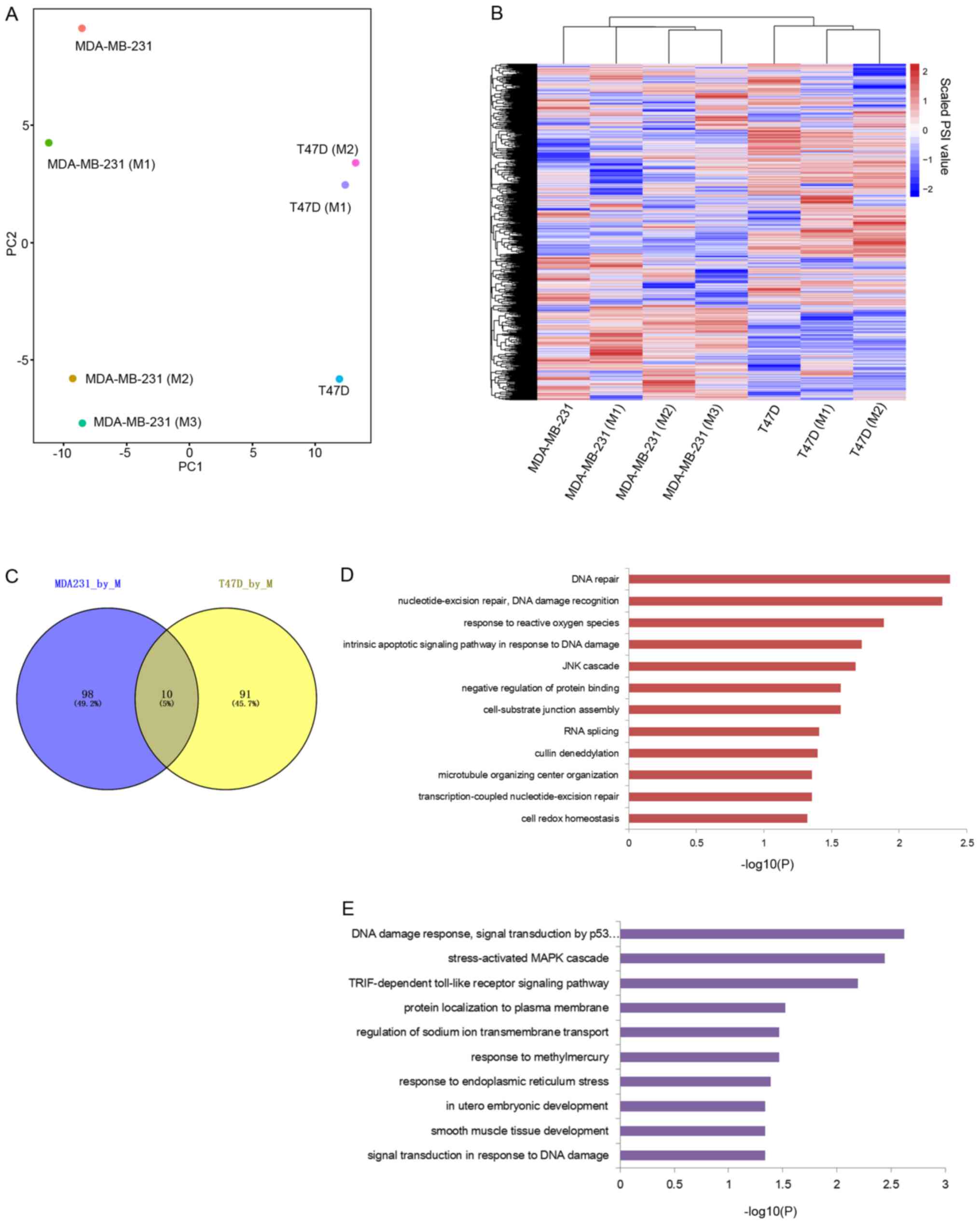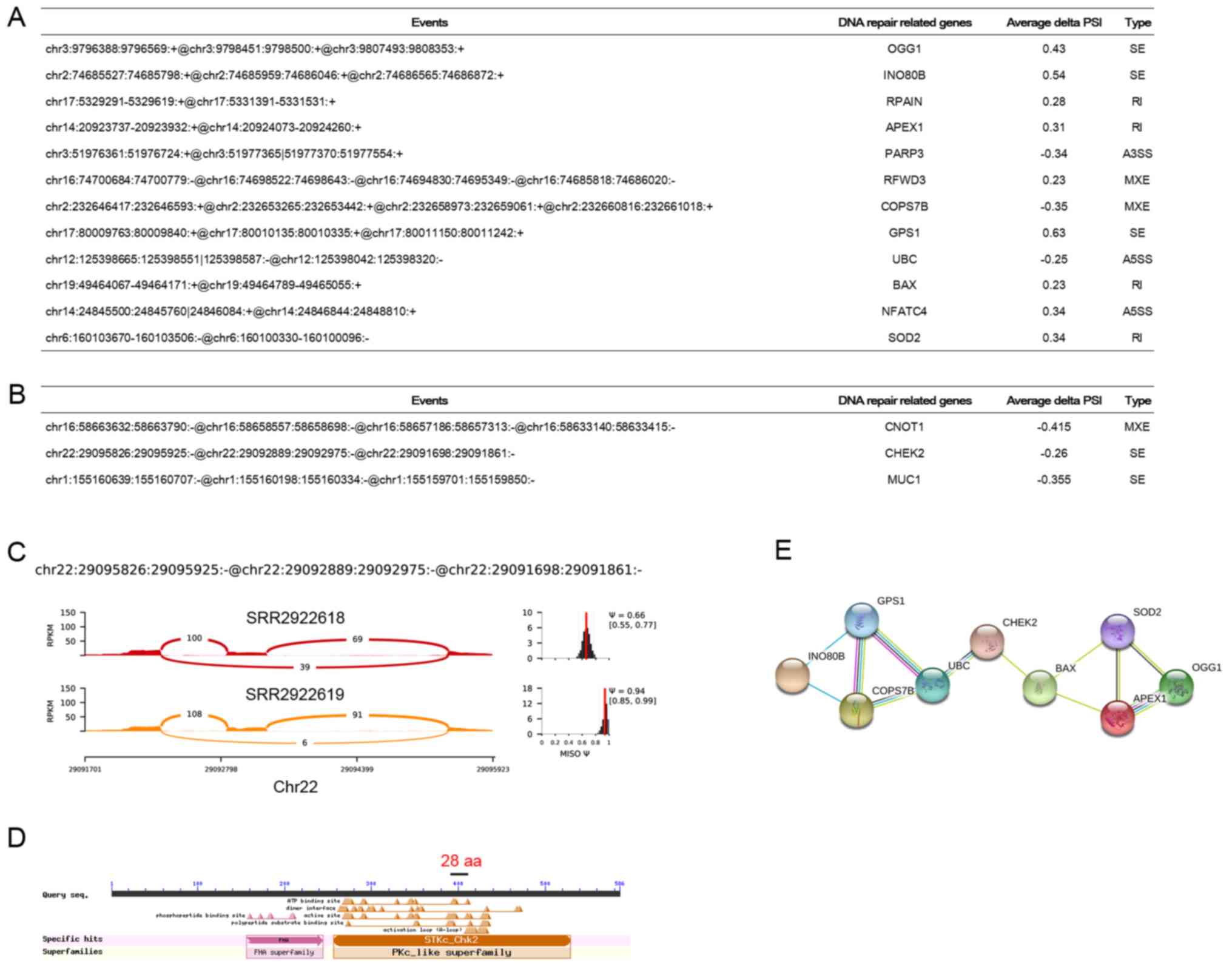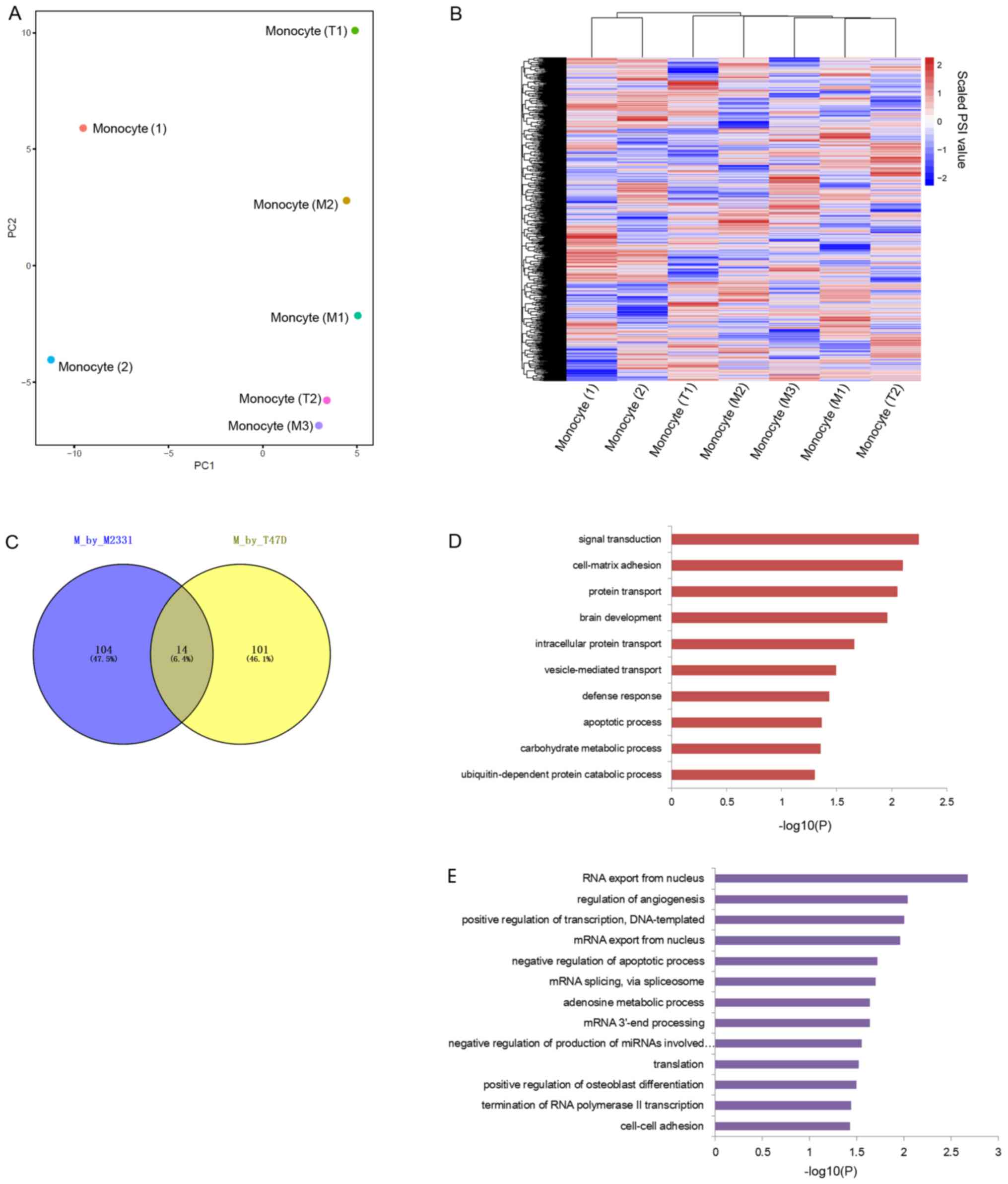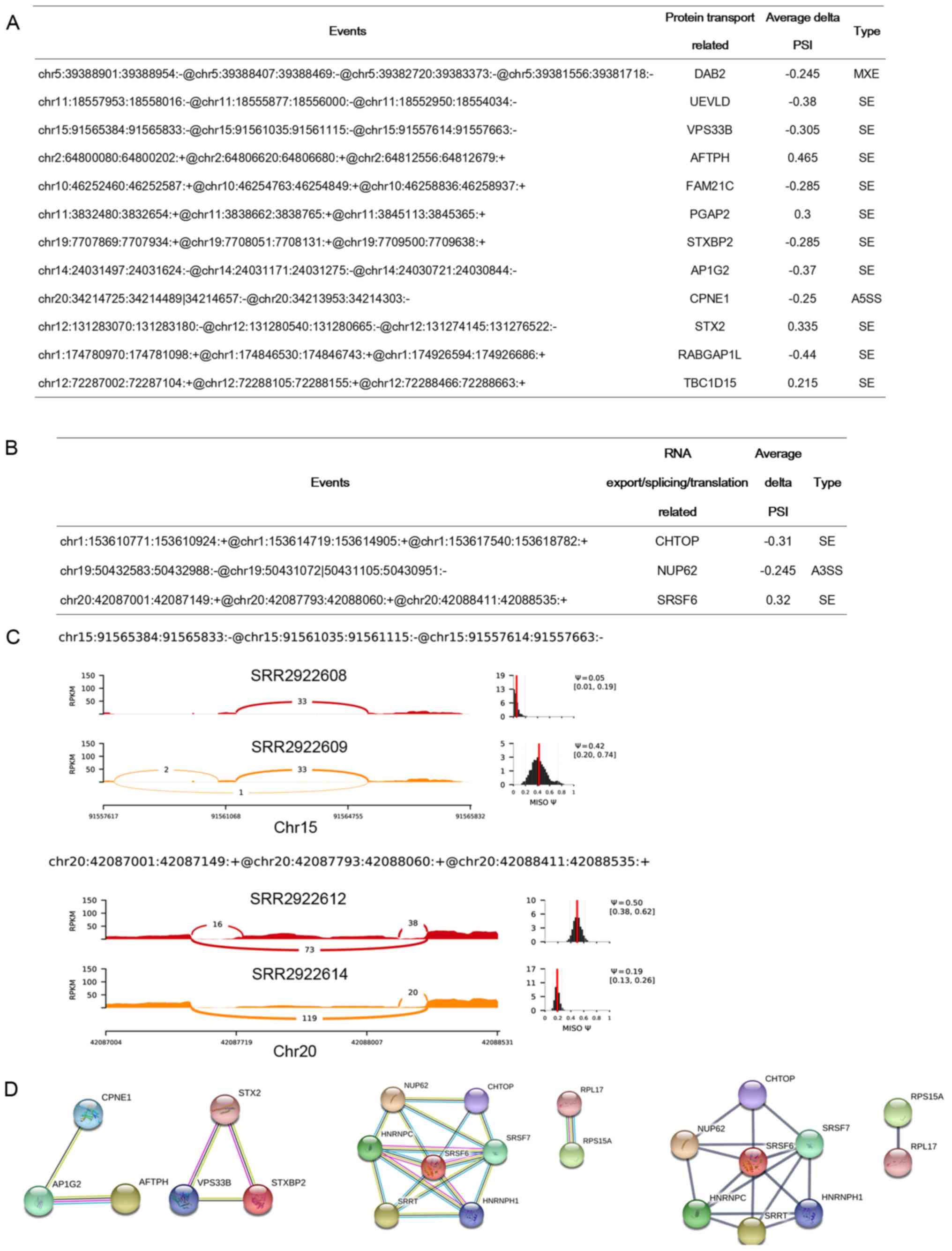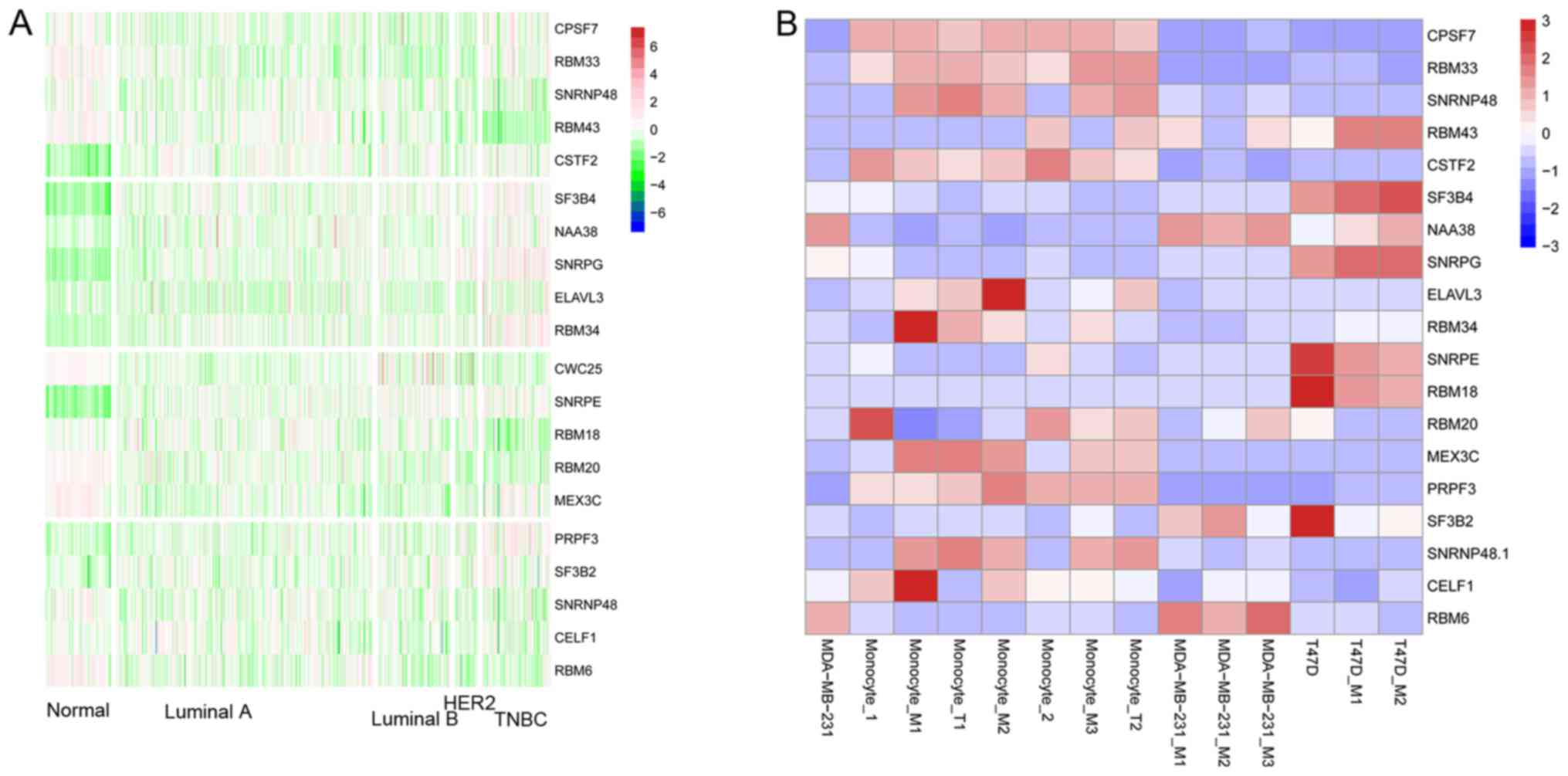|
1
|
Spill F, Reynolds DS, Kamm RD and Zaman
MH: Impact of the physical microenvironment on tumor progression
and metastasis. Curr Opin Biotechnol. 40:41–48. 2016. View Article : Google Scholar : PubMed/NCBI
|
|
2
|
Qian BZ and Pollard JW: Macrophage
diversity enhances tumor progression and metastasis. Cell.
141:39–51. 2010. View Article : Google Scholar : PubMed/NCBI
|
|
3
|
Danhier F, Feron O and Preat V: To exploit
the tumor microenvironment: Passive and active tumor targeting of
nanocarriers for anti-cancer drug delivery. J Control Release.
148:135–146. 2010. View Article : Google Scholar : PubMed/NCBI
|
|
4
|
Engblom C, Pfirschke C and Pittet MJ: The
role of myeloid cells in cancer therapies. Nat Rev Cancer.
16:447–462. 2016. View Article : Google Scholar : PubMed/NCBI
|
|
5
|
Mills CD: M1 and M2 macrophages: Oracles
of health and disease. Crit Rev Immunol. 32:463–488. 2012.
View Article : Google Scholar : PubMed/NCBI
|
|
6
|
Galdiero MR, Bonavita E, Barajon I,
Garlanda C, Mantovani A and Jaillon S: Tumor associated macrophages
and neutrophils in cancer. Immunobiology. 218:1402–1410. 2013.
View Article : Google Scholar : PubMed/NCBI
|
|
7
|
Balkwill F, Charles KA and Mantovani A:
Smoldering and polarized inflammation in the initiation and
promotion of malignant disease. Cancer Cell. 7:211–217. 2005.
View Article : Google Scholar : PubMed/NCBI
|
|
8
|
Mantovani A, Allavena P, Sica A and
Balkwill F: Cancer-related inflammation. Nature. 454:436–444. 2008.
View Article : Google Scholar : PubMed/NCBI
|
|
9
|
Zhang W, Wang LA, Zhou DB, Cui QC, Zhao DC
and Wu YJ: Expression of tumor-associated macrophages and vascular
endothelial growth factor correlates with poor prognosis of
peripheral T-cell lymphoma, not otherwise specified. Leukemia
Lymphoma. 52:46–52. 2011. View Article : Google Scholar : PubMed/NCBI
|
|
10
|
Zhang BC, Gao J, Wang J, Rao ZG, Wang BC
and Gao JF: Tumor-associated macrophages infiltration is associated
with peritumoral lymphangiogenesis and poor prognosis in lung
adenocarcinoma. Med Oncol. 28:1447–1452. 2011. View Article : Google Scholar : PubMed/NCBI
|
|
11
|
Azizi E, Carr AJ, Plitas G, Cornish AE,
Konopacki C, Prabhakaran S, Nainys J, Wu K, Kiseliovas V, Setty M,
et al: Single-cell map of diverse immune phenotypes in the breast
tumor microenvironment. Cell. 174:1293–1308.e36. 2018. View Article : Google Scholar : PubMed/NCBI
|
|
12
|
Lin EY, Li JF, Gnatovskiy L, Deng Y, Zhu
L, Grzesik DA, Qian H, Xue XN and Pollard JW: Macrophages regulate
the angiogenic switch in a mouse model of breast cancer. Cancer
Res. 66:11238–11246. 2006. View Article : Google Scholar : PubMed/NCBI
|
|
13
|
Lin EY, Nguyen AV, Russell RG and Pollard
JW: Colony- stimulating factor 1 promotes progression of mammary
tumors to malignancy. J Exp Med. 193:727–740. 2001. View Article : Google Scholar : PubMed/NCBI
|
|
14
|
Qian BZ, Li J, Zhang H, Kitamura T, Zhang
J, Campion LR, Kaiser EA, Snyder LA and Pollard JW: CCL2 recruits
inflammatory monocytes to facilitate breast-tumour metastasis.
Nature. 475:222–225. 2011. View Article : Google Scholar : PubMed/NCBI
|
|
15
|
Cortez-Retamozo V, Etzrodt M, Newton A,
Ryan R, Pucci F, Sio SW, Kuswanto W, Rauch PJ, Chudnovskiy A,
Iwamoto Y, et al: Angiotensin II drives the production of
tumor-promoting macrophages. Immunity. 38:296–308. 2013. View Article : Google Scholar : PubMed/NCBI
|
|
16
|
Oltean S and Bates DO: Hallmarks of
alternative splicing in cancer. Oncogene. 33:5311–5318. 2014.
View Article : Google Scholar : PubMed/NCBI
|
|
17
|
Liu HF, Lorenzini PA, Zhang F, Xu S, Wong
MS, Zheng J and Roca X: Alternative splicing analysis in human
monocytes and macrophages reveals MBNL1 as major regulator. Nucleic
Acids Res. 46:6069–6086. 2018. View Article : Google Scholar : PubMed/NCBI
|
|
18
|
Shadle PJ, Aldwin L, Nitecki DE and Koths
K: Human macrophage colony-stimulating factor heterogeneity results
from alternative mRNA splicing, differential glycosylation, and
proteolytic processing. J Cell Biochem. 40:91–107. 1989. View Article : Google Scholar : PubMed/NCBI
|
|
19
|
Leek RD, Lewis CE, Whitehouse R, Greenall
M, Clarke J and Harris AL: Association of macrophage infiltration
with angiogenesis and prognosis in invasive breast carcinoma.
Cancer Res. 56:4625–4629. 1996.PubMed/NCBI
|
|
20
|
Mahmoud SM, Lee AH, Paish EC, Macmillan
RD, Ellis IO and Green AR: Tumour-infiltrating macrophages and
clinical outcome in breast cancer. J Clin Pathol. 65:159–163. 2012.
View Article : Google Scholar : PubMed/NCBI
|
|
21
|
Hollmen M, Roudnicky F, Karaman S and
Detmar M: Characterization of macrophage-cancer cell crosstalk in
estrogen receptor positive and triple-negative breast cancer. Sci
Rep. 5:91882015. View Article : Google Scholar : PubMed/NCBI
|
|
22
|
Galperin MY, Fernandez-Suarez XM and
Rigden DJ: The 24th annual Nucleic Acids Research database issue: A
look back and upcoming changes. Nucleic Acids Res. 45:5627. 2017.
View Article : Google Scholar : PubMed/NCBI
|
|
23
|
Dobin A, Davis CA, Schlesinger F, Drenkow
J, Zaleski C, Jha S, Batut P, Chaisson M and Gingeras TR: STAR:
Ultrafast universal RNA-seq aligner. Bioinformatics. 29:15–21.
2013. View Article : Google Scholar : PubMed/NCBI
|
|
24
|
Liao Y, Smyth GK and Shi W: FeatureCounts:
An efficient general purpose program for assigning sequence reads
to genomic features. Bioinformatics. 30:923–930. 2014. View Article : Google Scholar : PubMed/NCBI
|
|
25
|
Robinson MD, McCarthy DJ and Smyth GK:
edgeR: A bioconductor package for differential expression analysis
of digital gene expression data. Bioinformatics. 26:139–140. 2010.
View Article : Google Scholar : PubMed/NCBI
|
|
26
|
Katz Y, Wang ET, Airoldi EM and Burge CB:
Analysis and design of RNA sequencing experiments for identifying
isoform regulation. Nat Methods. 7:1009–1015. 2010. View Article : Google Scholar : PubMed/NCBI
|
|
27
|
Lever J, Krzywinski M and Atman N: Points
of Significance principal component analysis. Nat Methods.
14:641–642. 2017. View Article : Google Scholar
|
|
28
|
Hotelling H: Analysis of a complex of
statistical variables into principal components. J Educ Psychol.
24:417–441. 1933. View Article : Google Scholar
|
|
29
|
Ginestet C: ggplot2: Elegant graphics for
data analysis. J R Stat Soc A Stat. 174:245. 2011. View Article : Google Scholar
|
|
30
|
Huang DW, Sherman BT and Lempicki RA:
Systematic and integrative analysis of large gene lists using DAVID
bioinformatics resources. Nat Protoc. 4:44–57. 2009. View Article : Google Scholar : PubMed/NCBI
|
|
31
|
Szklarczyk D, Morris JH, Cook H, Kuhn M,
Wyder S, Simonovic M, Santos A, Doncheva NT, Roth A, Bork P, et al:
The STRING database in 2017: Quality-controlled protein-protein
association networks, made broadly accessible. Nucleic Acids Res.
45:D362–D368. 2017. View Article : Google Scholar : PubMed/NCBI
|
|
32
|
Marchler-Bauer A, Bo Y, Han L, He J,
Lanczycki CJ, Lu S, Chitsaz F, Derbyshire MK, Geer RC, Gonzales NR,
et al: CDD/SPARCLE: Functional classification of proteins via
subfamily domain architectures. Nucleic Acids Res. 45:D200–D203.
2017. View Article : Google Scholar : PubMed/NCBI
|
|
33
|
Kent WJ, Zweig AS, Barber G, Hinrichs AS
and Karolchik D: BigWig and BigBed: Enabling browsing of large
distributed datasets. Bioinformatics. 26:2204–2207. 2010.
View Article : Google Scholar : PubMed/NCBI
|
|
34
|
Quinlan AR and Hall IM: BEDTools: A
flexible suite of utilities for comparing genomic features.
Bioinformatics. 26:841–842. 2010. View Article : Google Scholar : PubMed/NCBI
|
|
35
|
Eng L, Coutinho G, Nahas S, Yeo G, Tanouye
R, Babaei M, Dörk T, Burge C and Gatti RA: Nonclassical splicing
mutations in the coding and noncoding regions of the ATM gene:
Maximum entropy estimates of splice junction strengths. Hum Mutat.
23:67–76. 2004. View Article : Google Scholar : PubMed/NCBI
|
|
36
|
Domazet-Loso T and Tautz D: An ancient
evolutionary origin of genes associated with human genetic
diseases. Mol Biol Evol. 25:2699–2707. 2008. View Article : Google Scholar : PubMed/NCBI
|
|
37
|
Cai Z, Chehab NH and Pavletich NP:
Structure and activation mechanism of the CHK2 DNA damage
checkpoint kinase. Mol Cell. 35:818–829. 2009. View Article : Google Scholar : PubMed/NCBI
|
|
38
|
Nevanlinna H and Bartek J: The CHEK2 gene
and inherited breast cancer susceptibility. Oncogene. 25:5912–5919.
2006. View Article : Google Scholar : PubMed/NCBI
|
|
39
|
Zhao H, Traganos F and Darzynkiewicz Z:
Phosphorylation of p53 on Ser15 during cell cycle caused by Topo I
and Topo II inhibitors in relation to ATM and Chk2 activation. Cell
Cycle. 7:3048–3055. 2008. View Article : Google Scholar : PubMed/NCBI
|
|
40
|
Meijers-Heijboer H, van den Ouweland A,
Klijn J, Wasielewski M, de Snoo A, Oldenburg R, Hollestelle A,
Houben M, Crepin E, van Veghel-Plandsoen M, et al: Low-penetrance
susceptibility to breast cancer due to CHEK2(*)1100delC in
noncarriers of BRCA1 or BRCA2 mutations. Nat Genet. 31:55–59. 2002.
View Article : Google Scholar : PubMed/NCBI
|
|
41
|
Pevsner J, Hsu SC, Hyde PS and Scheller
RH: Mammalian homologues of yeast vacuolar protein sorting (vps)
genes implicated in Golgi-to-lysosome trafficking. Gene. 183:7–14.
1996. View Article : Google Scholar : PubMed/NCBI
|
|
42
|
Halachmi N and Lev Z: The Sec1 family: A
novel family of proteins involved in synaptic transmission and
general secretion. J Neurochem. 66:889–897. 1996. View Article : Google Scholar : PubMed/NCBI
|
|
43
|
Akbar MA, Mandraju R, Tracy C, Hu W,
Pasare C and Krämer H: ARC Syndrome-linked Vps33B protein is
required for inflammatory endosomal maturation and signal
termination. Immunity. 45:267–279. 2016. View Article : Google Scholar : PubMed/NCBI
|
|
44
|
Boisson B, Honda Y, Ajiro M, Bustamante J,
Bendavid M, Gennery AR, Kawasaki Y, Ichishima J, Osawa M, Nihira H,
et al: Rescue of recurrent deep intronic mutation underlying cell
type-dependent quantitative NEMO deficiency. J Clin Invest.
129:583–597. 2019. View Article : Google Scholar : PubMed/NCBI
|
|
45
|
Stower H: Alternative splicing: Regulating
Alu element ‘exonization’. Nature Rev Genet. 14:152–153. 2013.
View Article : Google Scholar : PubMed/NCBI
|
|
46
|
Akman HB, Öyken M, Tuncer T, Can T and
Erson-Bensan AE: 3′UTR shortening and EGF signaling: Implications
for breast cancer. Hum Mol Genet. 24:6910–6920. 2015.PubMed/NCBI
|
|
47
|
Lin J, Hu Y, Nunez S, Foulkes AS, Cieply
B, Xue C, Gerelus M, Li W, Zhang H, Rader DJ, et al:
Transcriptome-wide analysis reveals modulation of human macrophage
inflammatory phenotype through alternative splicing. Arterioscl
Throm Vas Biol. 36:1434–1347. 2016. View Article : Google Scholar
|















